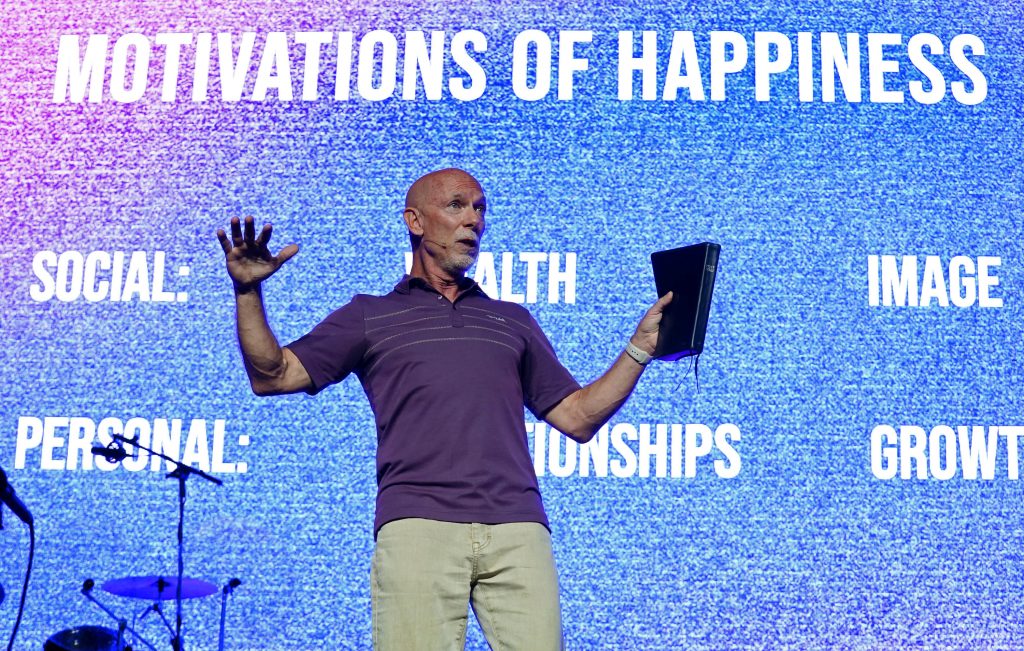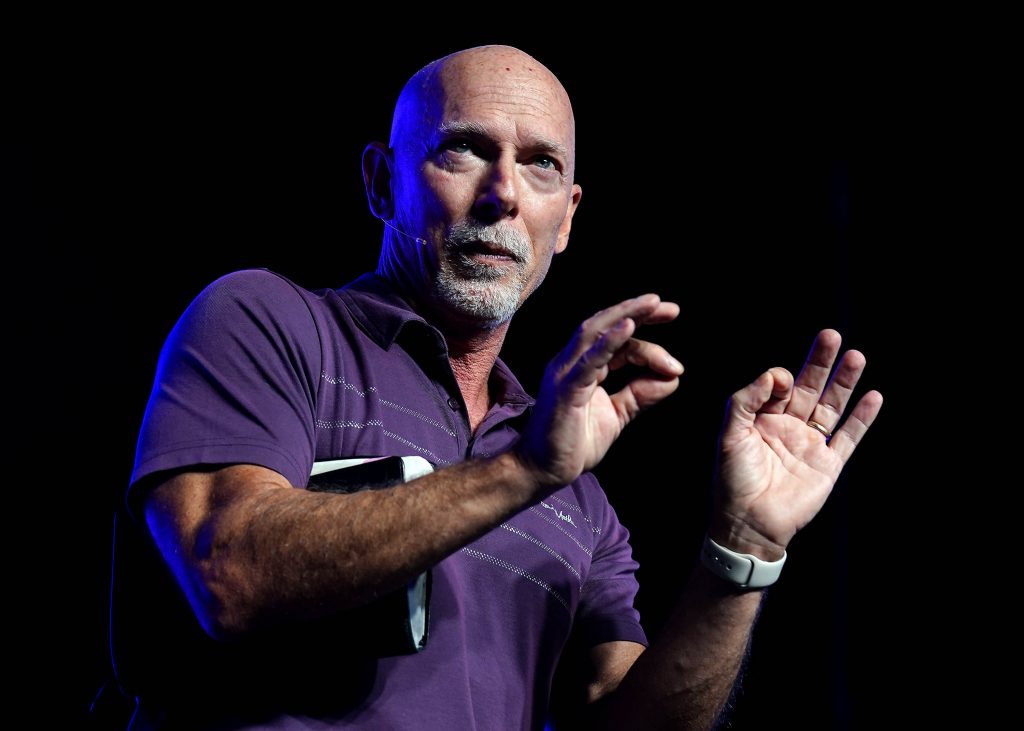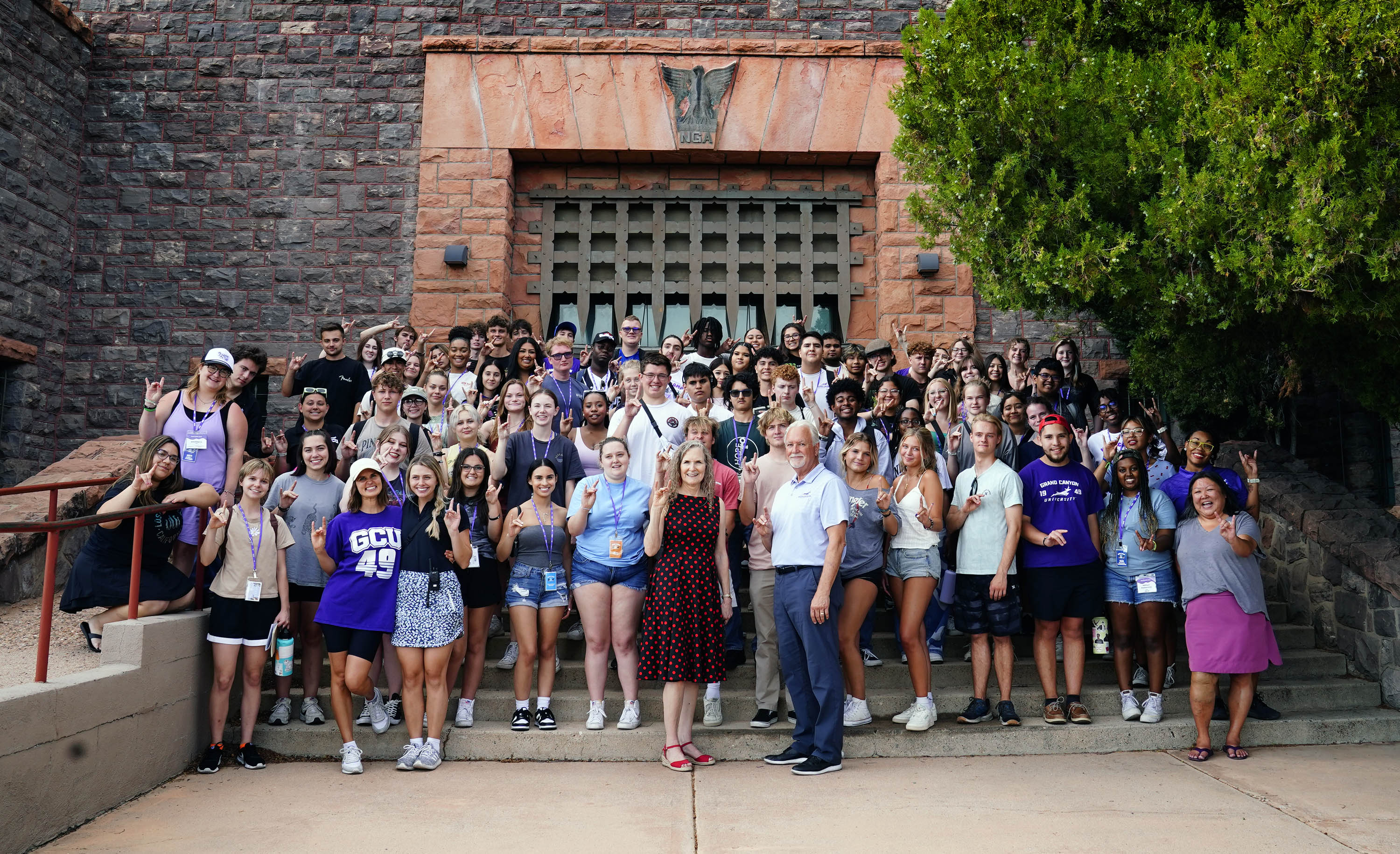
Photos by Ralph Freso / Slideshow
“Does God want you to be happy?”
The process toward the answer is lengthy, and Mark Moore, Teaching Pastor at Christ’s Church of the Valley, mapped out the process during Monday’s Chapel at Grand Canyon University Arena.
“I know this,” Moore said. “The world said you should be happy. Our culture says, ‘If it makes you happy, it’s OK.’"
But a line from Sheryl Crow’s 1996 hit single, “If It Makes You Happy” couldn’t get out of Moore’s head.
“If it makes you happy, it can’t be that bad.”
“What if we took Sheryl Crow and put her in the church?” Moore said. “I find adults saying that about themselves. I have never heard a parent say that to (his or her) 8-year-old boy.”
Specifically, allowing a child to satisfy their wishes is not always wise. That especially applies to toddlers.

“What makes them happy are electrical outlets,” Moore said to an amused crowd. “Not OK.”
Moore, referencing Psalm 1 throughout his message, injected science by explaining three chemicals that God designed in the brain for happiness.
Oxytocin is viewed as a “connection chemical,” starting with a hug, handshake or pat on the back, Moore said. Dopamine gives you motivation to do something when you are feeling pleasure and is “extremely addictive."
Serotonin is a “chemical of respect” that can influence you to perform unselfish acts, such as giving a parking space to another driver, Moore said.
God designed the brain so that people would receive those addictive chemicals in small doses, he added, and warned that abuse could lead to pitfalls like drugs.
“God wants you to be happy not because He loves you, but He loves the people around you,” Moore said. “He loves you, too. Don’t get me wrong. But when you do the positive things that give you that squirt of oxytocin, serotonin, dopamine, it blesses those around you, and then you begin to replicate those relationships around you better. That is how it was designed, and it is a genius design.”

Moore provided plenty of data to support that people are most successful when they are happy and helping others.
He referred to one study that said 50%of one’s happiness is genetic, leaving circumstances and choices to comprise the other 50%.
The audience seemed surprised to learn that 40% of one’s happiness was dictated by choices.
“Some of you are really unhappy,” Moore said. “Homesick? How long will that last? What if someone breaks up with you? Some of you already dated someone and broken up. Congratulations.”
Moore’s quip was met with brief laughter, but he stressed the ramifications of making correct decisions.
“Happiness is a chemical cocktail inside your brain,” Moore said. “That 40% is totally in your control. If you make the right choices, you can be a fabulously happy person.”
Moore referenced a study that started 75 years ago. It surveyed 750 19-year-olds – split equally between Harvard students and those who lived in impoverished conditions in Boston.
Some of those people are in their 90s, and the survey revealed the stability and fulfillment of their relationships – not money or education – made the biggest difference in their happiness.

“Those with money fought,” Moore said. “It had to do with honesty and trust with each other. If you have trusting relationships, you will be a happy person.”
The social and personal sources of happiness can clash, as Moore illustrated on a large screen.
For instance, wealth and relationships are in opposition. A person obsessed with making money is not investing in relationships. The same applies to those consumed with their image.
“When you’re interested in your image, you’re out to trying to please on social media,” Moore said. “You’re working for other people to see you, but you’re not growing personally because all you’re doing is imitating what you think other people want you to be.”
Moore pointed out that every generation wants attention from those above them. That could shift if someone aided someone with a disability, served in a ministry for those with metaphysical disabilities, coached an afterschool program or invested in a child who is economically impoverished or “socially on the outside.”

“When you invest in people all around you who need help, you get this rush of serotonin,” Moore said.
Furthermore, Moore said he is never “aged out” of discipling young men, dating to his days as a professor at Ozark Christian College in Joplin, Missouri. (1990-2012).
“If you start investing in people now by serving the community around you, serving the church you attend, serving the people on this campus, that is a serotonin rush,” Moore said. “That can be replicated and is far more permanent than the rush you get from someone above.
“That is the secret of being a happy person.”
GCU Senior Writer Mark Gonzales can be reached at Mark.Gonzales@gcu.edu
***
Related content
GCU News: Unite, don't divide for individual means, Mueller stresses in first Chapel service
GCU News: GCU seminary destined for 'enthusiasm' with on-time opening











